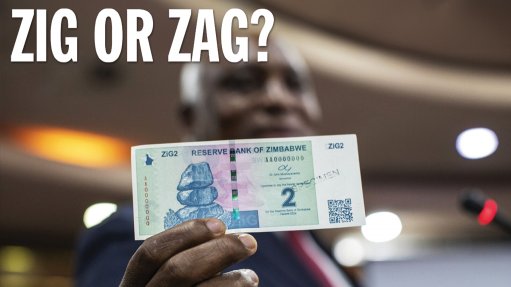SA needs to produce more PhDs to boost knowledge economy
South Africa is not spending enough on research to be truly competitive in the global economy. “We are working in a knowledge economy globally,” high- lighted National Research Foundation (NRF) executive director: applied research, innovation and collaboration Dr Rocky Skeef recently. “We are competing globally. There is a correlation between the citation [of scientific articles produced in a country] and the wealth intensity [of a country]. South Africa has a huge challenge in this respect in the global area.”
The NRF has established that South Africa accounts for 0.7% of the global population but only 0.16% of global spending on research. The country does produce 0.44% of papers listed by the Institute of Science Index (ISI), but accounts for a mere 0.31% of citations of ISI papers. The global average rate of citations is 0.5%, but South Africa’s share of highly cited papers is actually above this, at 0.56%.
“Below-par spending is restricting research performance,” concluded the NRF in a report cited by Skeef. “Significant parts of the science system [are] driven by emphasis on the number of outputs rather than quality ([shown by the] lower citation levels). The system does harbour significant strengths as reflected in the [proportion of] highly cited papers. Pockets of excellence [exist] in a landscape of average performance.”
He argued that South Africa should increase its national output of PhD graduates. The NRF talks about the “PhD Pipeline” which runs from matric (high school graduation) to PhD graduation. In 2005, South Africa had 86 500 matrics, 49 753 undergraduates, 23 000 honours students, 8 000 master’s students and only 1 200 PhD students. These figures cover all disciplines. For science, engineering and technology, the figures were worse – there were 26 000 matrics with maths and science passes, 15 991 science, engineering and tech- nology undergraduates, 3 200 honours students, 2 900 master’s students and 561 PhD students.
To change this will require a number of initiatives. There is a need for an integrated national strategy for the production of high-level skills, including PhDs. Funding for PhD studies in South Africa will have to be increased. Barriers that constrain the numbers of PhD candidates and supervisors, whether administrative, bureaucratic, legal, political or structural, have to be removed. Strong quality assurance will have to be applied to PhD programmes and contributions from different PhD programme models investigated.
Relations between universities, science councils and industry will have to be strengthened and broadened, with a focus on institutions which have been successful in producing PhDs (while giving help to less successful institutions). The issues of the high levels of ‘wastage’ in the PhD Pipeline will have to be dealt with as soon as possible. And the public have to be educated in the importance of this programme and the need to support it.
Simultaneously with growing its base of researchers, the country must continue to diversify them and replace retiring personnel. The NRF reports that, in 2000, the country had 823 PhD graduates, of whom 160 (19%) were black African, 38 (5%) were Coloured, 48 (6%) were Indian and 577 (70%) were white. In 2007, black African PhD graduates numbered 405, or 32%, Coloured graduates were 71 (6%), Indian 104 (8%) and whites 691 (54%), giving a total of 1 271.
However, in terms of PhDs active in South Africa, there has been a worrying ageing trend.
In 2000, 15% of the country’s PhDs were younger than 30, 43% were between 30 and 39, 29% between 40 and 49 and 13% were 50 and over. In 2007, the pro- portion of PhDs under 30 had dropped to 12%, those between 30 and 39 had declined to 39%, the figure for those between 40 and 49 had risen slightly to 40% and the proportion of those 50 and over had increased to 19%.
“We are not generating, at a rate fast enough, new young scientists,” he warned.
Skeef was addressing the French-South African Chamber of Commerce and Industry in Johannesburg.
Comments
Press Office
Announcements
What's On
Subscribe to improve your user experience...
Option 1 (equivalent of R125 a month):
Receive a weekly copy of Creamer Media's Engineering News & Mining Weekly magazine
(print copy for those in South Africa and e-magazine for those outside of South Africa)
Receive daily email newsletters
Access to full search results
Access archive of magazine back copies
Access to Projects in Progress
Access to ONE Research Report of your choice in PDF format
Option 2 (equivalent of R375 a month):
All benefits from Option 1
PLUS
Access to Creamer Media's Research Channel Africa for ALL Research Reports, in PDF format, on various industrial and mining sectors
including Electricity; Water; Energy Transition; Hydrogen; Roads, Rail and Ports; Coal; Gold; Platinum; Battery Metals; etc.
Already a subscriber?
Forgotten your password?
Receive weekly copy of Creamer Media's Engineering News & Mining Weekly magazine (print copy for those in South Africa and e-magazine for those outside of South Africa)
➕
Recieve daily email newsletters
➕
Access to full search results
➕
Access archive of magazine back copies
➕
Access to Projects in Progress
➕
Access to ONE Research Report of your choice in PDF format
RESEARCH CHANNEL AFRICA
R4500 (equivalent of R375 a month)
SUBSCRIBEAll benefits from Option 1
➕
Access to Creamer Media's Research Channel Africa for ALL Research Reports on various industrial and mining sectors, in PDF format, including on:
Electricity
➕
Water
➕
Energy Transition
➕
Hydrogen
➕
Roads, Rail and Ports
➕
Coal
➕
Gold
➕
Platinum
➕
Battery Metals
➕
etc.
Receive all benefits from Option 1 or Option 2 delivered to numerous people at your company
➕
Multiple User names and Passwords for simultaneous log-ins
➕
Intranet integration access to all in your organisation

















